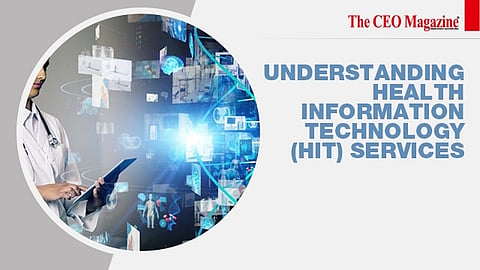
- News
- Women
- Magazine
- IndustryIndustry
- InsightsInsights
- Success Stories
- PublishPublish
- ContactContact
- Media KitMedia Kit

Understanding Health Information Technology (HIT) Services
Health Information Technology (HIT) services refer to the use of technology to manage and process health-related information. HIT services are designed to improve patient outcomes, reduce costs, and streamline healthcare operations. In this blog post, we will explore the various types of HIT services and how they are used in healthcare.
EHRs are digital versions of patient health records. They allow healthcare providers to access and update patient information in real-time, from anywhere, with an internet connection.
EHRs also enable providers to share patient information securely with other healthcare organisations, reducing the need for manual paperwork and improving care coordination.
Telehealth services are used to provide medical care remotely, using technology such as video conferencing, remote monitoring, and mobile health applications.
Telehealth services have become increasingly popular during the COVID-19 pandemic, as they allow patients to receive care without risking exposure to the virus.
HIEs are networks that enable healthcare providers to share patient health information securely and electronically. HIEs can help providers make more informed decisions about patient care by giving them access to a patient's complete medical history, regardless of where they previously received care.
CDS systems provide healthcare providers with real-time guidance on the best course of action for patient care. CDS systems use algorithms and data analysis to provide recommendations based on patient data and medical best practices.
RCM services are designed to help healthcare providers manage their financial operations more efficiently. RCM services can include billing and claims processing, revenue cycle analytics, and patient payment processing.
HIT services can help providers make more informed decisions about patient care by providing them with access to more comprehensive and accurate patient data. This can improve patient outcomes, reduce medical errors, and improve patient satisfaction.
HIT services can help healthcare providers streamline their operations and reduce administrative burdens. This can increase efficiency, reduce costs, and improve staff satisfaction.
HIT services use advanced security measures to protect patient health information. This can help prevent data breaches and protect patient privacy.
HIT services enable healthcare providers to share patient information securely and electronically, reducing the need for manual paperwork and improving care coordination.
Health Information Technology (HIT) services are transforming the healthcare industry by improving patient outcomes, increasing efficiency, enhancing data security, and improving care coordination.
As the healthcare industry continues to evolve, the role of HIT services will only become more important in ensuring that patients receive the best possible care.
Follow us on Google News
